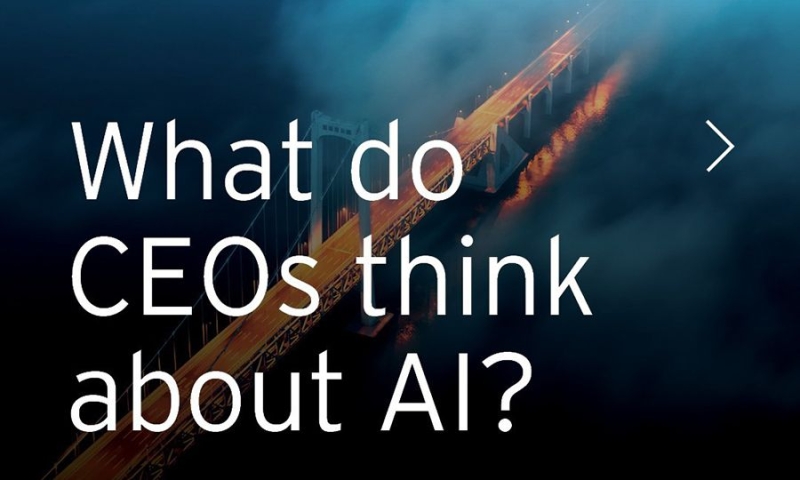
- 65% of respondents see AI as a powerful tool to drive business efficiency – but also worry about unintended consequences
- 88% are incorporating AI into capital allocation, while nearly half are planning major artificial intelligence investments next year
- The Mergers & Acquisitions expected to rebound in 2024 – 71% of CEOs use AI to improve strategic deals
CEOs worldwide are turning to the opportunities created by artificial intelligence, but remain wary of unknown and unpredictable consequences, according to the findings of EY's latest CEO Outlook Pulse survey. Nearly two-thirds (65%) of CEOs agree that artificial intelligence is a powerful tool. However, almost the same percentage say more work is needed to address social and ethical risks as well as security risks – such as cyber-attacks, disinformation and falsification of personal characteristics.
The survey, which captures the views of 1,200 CEOs worldwide on AI, capital allocation, investment, sustainability and transformation strategies, found that 66% of CEOs believe that job losses caused by AI will intelligence will be offset by new roles and career opportunities created by this technology.
However, while CEOs embrace the potential benefits AI can bring to business and society, they are aware of the emerging technology's risks. Two-thirds (67%) of CEOs said the business community needs to focus on the ethical implications of AI, while nearly the same percentage (64%) say businesses are not doing enough to manage the unintended consequences of this technology.
Despite the concerns, CEOs are adapting their investment strategies to maximize the benefits that AI could bring to their businesses. A large majority of CEOs (88%) are incorporating AI into their capital allocation, of which 43% are actively investing in the technology, while of the remaining 45% said they plan to make significant investments in AI in the next 12 months.< /p>
Economic instability remains. Sustainable development initiatives at a turning point
Despite continued macroeconomic volatility, CEOs are modestly more optimistic than they were in early 2023 about the prospects for avoiding a global economic downturn. Only 33% expect a severe temporary or persistent recession, compared to 50% in January. However, CEOs remain divided, with 47% saying they are more optimistic and 36% less optimistic about the outlook for their company's financial performance compared to the beginning of the year.
The harsh reality of today's environment of low growth, high inflation and rising interest rates has forced many CEOs to focus more on short-term performance, particularly at the expense of sustainable growth goals.
Today, just 38% of CEOs say they prioritize sustainability issues when making capital allocation decisions. In contrast, according to the January 2022 CEO Outlook, 83% of CEOs said that sustainability and ESG issues would be an important driver of growth in the short to medium term.
Recovery in Mergers & Acquisitions in 2024
Deal-making remains a priority for CEOs. Almost all (98%) say they will actively pursue a strategic deal in the next 12 months (up from 89% in January 2023), with 59% actively pursuing M&A, 47% considering divestitures and 63% intend to enter into strategic alliances or joint ventures. The appetite for takeovers is nearing an all-time high, but hurdles to getting deals done in the current market, such as tightening regulation and the higher cost of capital, will likely hamper many of these plans.
Improving technological capabilities and innovation is today's main driver for M&A, with 16% of respondents stating this as a primary investment objective. In addition, CEOs are incorporating AI into their M&A strategies – leveraging these technologies when sourcing and closing their deals. 70% integrate AI into the trading process, either significantly or through pilot programs. Only a small minority (5%) do not plan to use AI – and risk being overtaken by the competition.
Commenting on the research findings, Stelios Dimitriou, Partner and Head of Corporate Strategy and Transactions at EY Cyprus, said: “CEOs are clearly seeing the huge benefits of artificial intelligence and its potential to increase productivity and the future competitive advantage of businesses them, as well as the positive impact for all stakeholders. Therefore they systematically invest in this technology. However, they also acknowledge societal concerns about the unintended consequences of artificial intelligence. They also understand the role that business leaders will be called upon to play in addressing these fears. At a time when the uncertain macroeconomic environment is driving companies to focus on short-term performance, CEOs must maintain their focus on sustainability and address societal concerns about ethical issues, including how the use of artificial intelligence could affect key areas of our lives, such as personal data.”
< iframe width='300px' height='500px' src='https://www.adstorebluebird.cy/api/banner/ServeBanner?zoneId=2734' frameborder='0' scrolling='no'>




